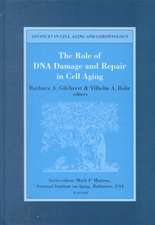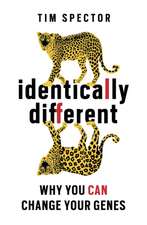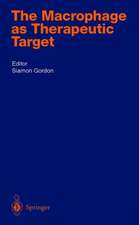Phagocytosis: The Host: Advances in Cellular and Molecular Biology of Membranes and Organelles, cartea 5
Editat de S. Gordonen Limba Engleză Hardback – 22 noi 1999
This filed of study is growing rapidly after a somewhat slow start over recent decades. This collection of invited chapters attempts to reflect current research, and brings together cell biologists, microbiologists and immunologists with disparate interests. However, there is a certain unity, even repetition of key themes, hopefully like a symphony rather than a boring catalogue. It will be evident that editorial bias favors intracellular paratism and medically important organisms. The neutrophil is far more than a supporting player to the macrophage, and some attempt is made to remind the reader of some of its unique skills. To retain a manageable size, the emphasis is on relatively early events such as mutual recognition, cell entry, and response, rather than on longterm changes in gene expression by either host cell or pathogen. Viruses are excluded not because of lack of importance but because of somewhat different research approaches, although it is cytogenes, share common strategies in invasion and intercellular spread.
| Toate formatele și edițiile | Preț | Express |
|---|---|---|
| Hardback (2) | 704.30 lei 6-8 săpt. | |
| ELSEVIER SCIENCE – 27 ian 2000 | 704.30 lei 6-8 săpt. | |
| ELSEVIER SCIENCE – 22 noi 1999 | 710.68 lei 6-8 săpt. |
Preț: 710.68 lei
Preț vechi: 922.96 lei
-23% Nou
Puncte Express: 1066
Preț estimativ în valută:
135.99€ • 145.42$ • 113.38£
135.99€ • 145.42$ • 113.38£
Carte tipărită la comandă
Livrare economică 17 aprilie-01 mai
Preluare comenzi: 021 569.72.76
Specificații
ISBN-13: 9781559389990
ISBN-10: 1559389990
Pagini: 521
Dimensiuni: 156 x 234 x 30 mm
Greutate: 0.93 kg
Ediția:New.
Editura: ELSEVIER SCIENCE
Seria Advances in Cellular and Molecular Biology of Membranes and Organelles
ISBN-10: 1559389990
Pagini: 521
Dimensiuni: 156 x 234 x 30 mm
Greutate: 0.93 kg
Ediția:New.
Editura: ELSEVIER SCIENCE
Seria Advances in Cellular and Molecular Biology of Membranes and Organelles
Cuprins
Contents. List of Contributors. Introduction to the Series. Preface (S. Gordon). Secton I Context. The early History of Phagocytosis (T.P. Stossel). Drosophila Hemocytes, Phagocytosis, and Croquemort, a Macrophage Receptor (N.C. Franc). Phagocytosis by Nonprofessional Phagocytes (D. Williams-Herman and Z. Werb). Section II Receptors. Scavenger Receptors and Phagocytosis of Bacteria and Apoptotic Cells (N. Platt, R. Haworth, R.P. da Silva, and S. Gordon). Mannose Receptor and Phagocytosis (I.P. Fraser, R. Alan and B. Ezekowitz). Integrin Receptors of Phagocytes (S.D. Blystone and E.J. Brown). Fc Receptor-Mediated Phagocytosis (S. Greenberg). Section III Signaling. Heterogeneity in Macrophage Phagocytosis (A. Aderem and D.M. Underhill). Signaling through RHO GTPases in Phagocytes (A.E. Abo). Regulatory Roles of Phosphatidylinositol (4,5) Bisphosphate in Cell Signalin, Membrane Traffic, and the Cytoskeleton (S. Cockcroft). Section IV The Pathway. Pathways through the Macrophage Vacuolar Compartment (J.A. Swanson). Sequential Maturation of Phagosomes provides unique Targets for Pathogens (C. Alvarez-Dominguez, L. Mayorga, and P.D. Stahl). Phagosomal Acidification: Mechanisms and Funtional Significance (D.J. Hackam, O.
D. Rotstein, and S. Grinstein). The Phagocyte Actin Cytoskeleton (H. Sun, K. Lin, M. Yamamoto, and H.L. Yin). Section V Responses. Nramp1: A Novel Macrophage Protein with a Key Function in Resistance to Intracellular Pathogens (S. Gruenheid, E. Skamene, and P. Gros). Uptake and Presentation of Phagocytosed Antigens by Dendritic Cells (M.L. Albert, S. Turley, W. Garrett, I. Mellman, K. Inaba, N. Bhardway, and R.M. Steinman). Processing and Presentation of Phagocytosed Antigens to the Immune System (J. Pieters). Antimicrobial Mechanisms of Macrophages (M.U. Shiloh and C.F. Nathan). Components and Organization of the Nadph Oxidase of Phagocytic Cells: Its Role in Microbial Killing and in the Molecular Pathology of Chronic Granulomatous Disease (A.W. Segal, f. wientjes, R.W. Stockley, and L.V. Dekker). Oxygen-Independent Antimicrobial Mechanisms of PMN (P. Elsbach). Index.
D. Rotstein, and S. Grinstein). The Phagocyte Actin Cytoskeleton (H. Sun, K. Lin, M. Yamamoto, and H.L. Yin). Section V Responses. Nramp1: A Novel Macrophage Protein with a Key Function in Resistance to Intracellular Pathogens (S. Gruenheid, E. Skamene, and P. Gros). Uptake and Presentation of Phagocytosed Antigens by Dendritic Cells (M.L. Albert, S. Turley, W. Garrett, I. Mellman, K. Inaba, N. Bhardway, and R.M. Steinman). Processing and Presentation of Phagocytosed Antigens to the Immune System (J. Pieters). Antimicrobial Mechanisms of Macrophages (M.U. Shiloh and C.F. Nathan). Components and Organization of the Nadph Oxidase of Phagocytic Cells: Its Role in Microbial Killing and in the Molecular Pathology of Chronic Granulomatous Disease (A.W. Segal, f. wientjes, R.W. Stockley, and L.V. Dekker). Oxygen-Independent Antimicrobial Mechanisms of PMN (P. Elsbach). Index.
Recenzii
from:Philippe Sansonetti
"Phagocytosis: the Host excellently reflects the revolution that has occurred in this field. In other words, the science of phagocytosis is now dominated by an analytical approach based on deciphering the signals that carry out each of the critical steps of the process. Edited by a master of the discipline, in 21 chapters, this book - with great justice dedicated to the late Zanvil A. Cohn - covers the molecular and cellular aspects of phagocytic processes in a logical progression. The best specialists in the field have risen to the challenge." --Journal of Cell Science
"Phagocytosis: the Host excellently reflects the revolution that has occurred in this field. In other words, the science of phagocytosis is now dominated by an analytical approach based on deciphering the signals that carry out each of the critical steps of the process. Edited by a master of the discipline, in 21 chapters, this book - with great justice dedicated to the late Zanvil A. Cohn - covers the molecular and cellular aspects of phagocytic processes in a logical progression. The best specialists in the field have risen to the challenge." --Journal of Cell Science
























